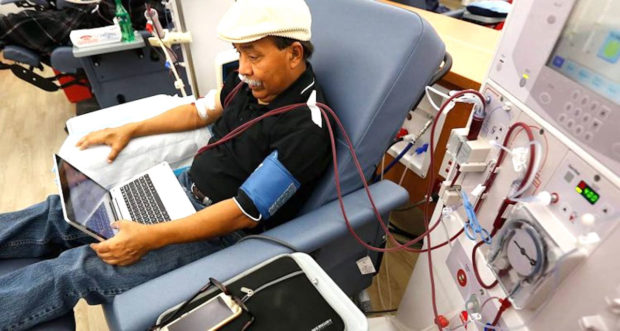Judge blocks California law on dialysis clinics

Adrian Perez undergoes dialysis at a DaVita Kidney Care clinic in Sacramento. AP FILE
SANTA ANA, California — A federal judge on Monday blocked enforcement of a California law aimed at preventing increased billing costs at dialysis clinics.
There is “a dire public interest” in granting a preliminary injunction that would bar enforcement for months while a lawsuit against it proceeds through the courts, Judge David O. Carter said.
There is “a dire public interest” in granting a preliminary injunction that would bar enforcement for months while a lawsuit against it proceeds through the courts, Judge David O. Carter said.
If Assembly Bill 290 is permitted to take effect before it is reviewed, “thousands of California HIPP recipients—who number among the poorest and most medically vulnerable of all Californians—may not be able to afford the dialysis treatments that keep them alive (or may be forced to dedicate all of their scant financial resources to medical care) and may face further delays in receiving a transplant,” Carter wrote.
HIPP refers to the Health Insurance Premium Program run by the nonprofit American Kidney Fund. The program, paid for by dialysis clinics, covers insurance premiums for low-income patients with kidney disease who need dialysis.
California passed the law this year in an effort to deter dialysis clinics from encouraging patients to enroll in health plans that give them higher reimbursement rates.
But the lawsuit contends the law will force the American Kidney Fund to close down the program, which helps about 3,700 patients in the state.
The fund has said the law creates requirements in California that conflict with federal laws the program must follow.
State lawmakers contended that two large dialysis clinics in California were contributing to the fund’s program, which in turn covered their patients’ premiums with private insurers that paid higher reimbursement rates back to the clinics.
The state passed the law after a ballot measure to cap dialysis clinics’ profits failed in 2018.







